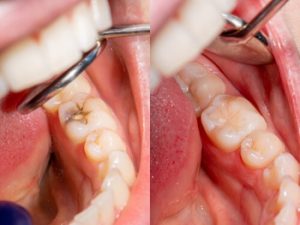Facing a dental issue that requires treatment can raise many questions, especially about costs. How much a root canal costs is a common concern, but pricing isn’t the same for everyone. Several factors influence the final amount, making it important to understand what goes into the total expense. So, how much does a root canal cost? Knowing what to expect can help in planning for treatment without unnecessary stress. While cost matters, addressing the issue promptly can make a significant difference in both comfort and long-term dental health.
What Is a Root Canal?
When a damaged or infected tooth causes persistent discomfort, it may require treatment to prevent further complications. A root canal focuses on addressing the issue within the tooth while preserving its structure. Whether it affects front teeth or molars, this procedure helps relieve severe tooth pain and restores function. By saving the natural tooth, it allows for a healthier and more stable smile.
 How Much Will a Root Canal Procedure Cost You?
How Much Will a Root Canal Procedure Cost You?
The root canal cost in Australia relies on several factors, including the tooth’s location and the complexity of the procedure. On average, the price begins at approximately $900, with costs rising for more intricate cases. The total expense varies for each individual, making a consultation with a dentist essential for an accurate estimate. Seeking professional advice ensures clarity on pricing while preserving the health of your tooth.
What Are the Key Elements That Affect Root Canal Treatment Costs?
The Complexity of the Case
Not all root canal treatments are the same, and the level of difficulty plays a significant role in determining the cost. Teeth with multiple roots, such as molars, require more time and effort to treat compared to front teeth with a single root. If an infection has spread deep into the surrounding tissue, additional steps may be necessary, increasing both the duration and expense of the procedure. In cases where an obstruction is present, extra precision and advanced techniques may be needed to complete the treatment effectively. The more complex the case, the higher the cost due to the additional resources and expertise required.
The Experience of the Dentist
A dentist’s level of expertise and training can also influence the cost of treatment. Highly skilled professionals with years of experience may charge more due to their ability to handle complex cases efficiently. Their expertise often translates to more precise work, reducing the risk of complications and the need for follow-up procedures. While it may be tempting to seek out lower-cost options, it is important to prioritise quality care to ensure the best possible outcome. Choosing a provider with a strong track record in root canal therapy can ultimately save money in the long run by reducing the likelihood of additional treatments.
Additional Treatments and Procedures
Some cases require additional treatment beyond a root canal to fully restore the tooth’s function and strength. When a significant portion of the structure is compromised, placing a dental crown helps reinforce and protect it from further damage. The material selected for the crown—whether ceramic, porcelain, or metal—affects both durability and appearance, influencing the overall cost. If the infection has caused bone deterioration, further dental work may be necessary to support long-term stability. While these extra steps may increase expenses, they play a crucial part in ensuring the treated tooth remains functional and healthy over time.
The Role of Dental Insurance and Payment Options
For those with private health insurance, coverage for a root canal may be available, depending on the specifics of the policy. Some plans cover a portion of the cost, while others may require patients to meet a deductible before benefits apply. The level of coverage can vary, making it important to review policy details before proceeding with treatment. Patients without insurance may explore flexible financing options or payment plans to make the procedure more manageable. Discussing available financial solutions with a dental clinic can help in planning treatment without unnecessary stress.
Understanding what affects root canal treatment cost lets individuals make educated decisions about their care. Factors such as case complexity, the tooth’s location, and additional procedures all contribute to the total expense. While pricing can vary, prioritising professional care and exploring available financial options can make treatment more accessible. Consulting with a dentist ensures the right approach is taken while maintaining both oral health and financial well-being.
What Does a Root Canal Treatment Involve?
Identifying the Need for Treatment
Before the root canal procedure begins, a thorough examination is conducted to determine if intervention is necessary. Symptoms such as sensitivity, persistent pain, or swelling may indicate that a deeper issue exists within the tooth. Diagnostic tools such as X-rays help in identifying the extent of the problem and confirming whether the inner layers have been compromised. Once the issue is detected, the dentist discusses the findings and explains the next steps. Early detection and timely treatment can prevent further damage to the surrounding teeth and reduce the risk of complications.
Preparing for the Procedure

Cleaning and Shaping the Tooth
After the initial access is made, the dentist carefully removes the infected tissue to prevent further complications. Special instruments are used to clean the inner chamber, ensuring that all traces of infection are eliminated. The root canal process also involves shaping the space to prepare it for sealing, reducing the chance of reinfection. Throughout this step, precision is key to maintaining the structural integrity of the tooth. Once cleaned, the chamber is thoroughly disinfected before moving to the next stage.
Sealing the Tooth
To complete the treatment, the cleaned space must be sealed to protect it from future infections. A biocompatible material is used to fill the empty chamber, providing stability and preventing bacteria from re-entering. This material ensures that the tooth retains its function while remaining protected. In some cases, a temporary covering may be placed to safeguard the area until a permanent solution is applied. Proper sealing is essential in maintaining long-term dental health and ensuring the success of the procedure.
Strengthening the Tooth
Following the completion of the dental procedures, a permanent restoration is often necessary to reinforce the structure. A crown is commonly placed over the treated area to provide durability and support. The selection of materials, such as porcelain or ceramic, is based on factors like aesthetics and strength. The final restoration allows the tooth to function as it did before the infection occurred. With the right upkeep, the treated tooth can continue to serve its purpose for many years.
Quality Dental Care for Lasting Relief

Our team is ready to assist you with personalised advice and professional care. Please call us at (02) 8806 0790 to book an appointment and take a step towards lasting oral health.
Note: Any surgical or invasive procedure carries risks. Before proceeding, you should seek a second opinion from an appropriately qualified health practitioner.
References
https://www.medicalnewstoday.com/articles/142780
https://www.webmd.com/oral-health/root-canals


 How Much Will a Root Canal Procedure Cost You?
How Much Will a Root Canal Procedure Cost You?